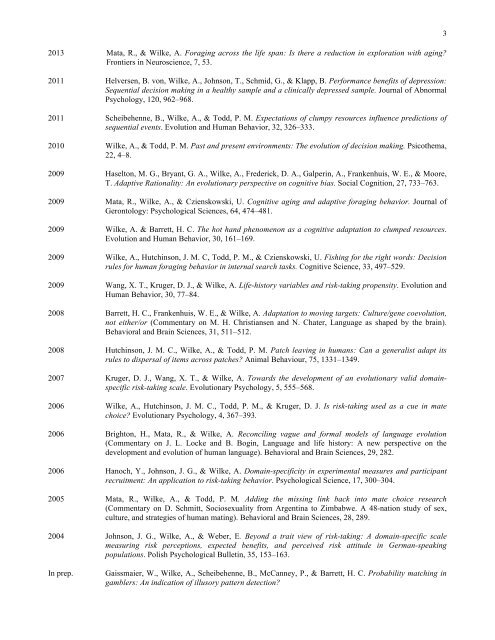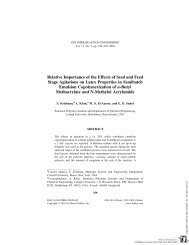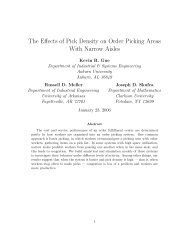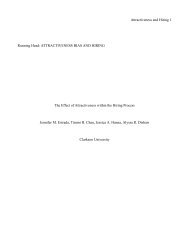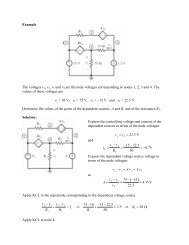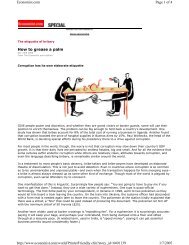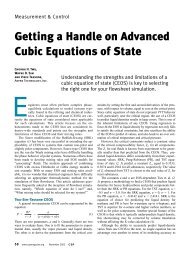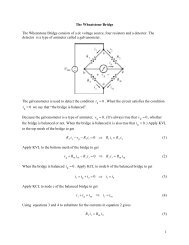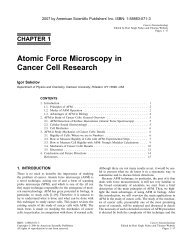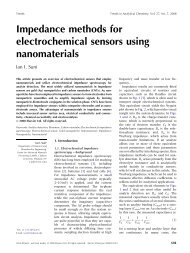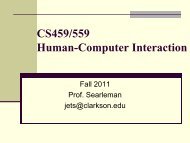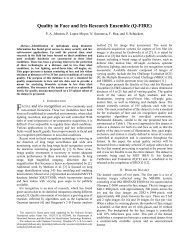download vita - Clarkson University
download vita - Clarkson University
download vita - Clarkson University
Create successful ePaper yourself
Turn your PDF publications into a flip-book with our unique Google optimized e-Paper software.
2013 Mata, R., & Wilke, A. Foraging across the life span: Is there a reduction in exploration with aging?<br />
Frontiers in Neuroscience, 7, 53.<br />
2011 Helversen, B. von, Wilke, A., Johnson, T., Schmid, G., & Klapp, B. Performance benefits of depression:<br />
Sequential decision making in a healthy sample and a clinically depressed sample. Journal of Abnormal<br />
Psychology, 120, 962–968.<br />
2011 Scheibehenne, B., Wilke, A., & Todd, P. M. Expectations of clumpy resources influence predictions of<br />
sequential events. Evolution and Human Behavior, 32, 326–333.<br />
2010 Wilke, A., & Todd, P. M. Past and present environments: The evolution of decision making. Psicothema,<br />
22, 4–8.<br />
2009 Haselton, M. G., Bryant, G. A., Wilke, A., Frederick, D. A., Galperin, A., Frankenhuis, W. E., & Moore,<br />
T. Adaptive Rationality: An evolutionary perspective on cognitive bias. Social Cognition, 27, 733–763.<br />
2009 Mata, R., Wilke, A., & Czienskowski, U. Cognitive aging and adaptive foraging behavior. Journal of<br />
Gerontology: Psychological Sciences, 64, 474–481.<br />
2009 Wilke, A. & Barrett, H. C. The hot hand phenomenon as a cognitive adaptation to clumped resources.<br />
Evolution and Human Behavior, 30, 161–169.<br />
2009 Wilke, A., Hutchinson, J. M. C, Todd, P. M., & Czienskowski, U. Fishing for the right words: Decision<br />
rules for human foraging behavior in internal search tasks. Cognitive Science, 33, 497–529.<br />
2009 Wang, X. T., Kruger, D. J., & Wilke, A. Life-history variables and risk-taking propensity. Evolution and<br />
Human Behavior, 30, 77–84.<br />
2008 Barrett, H. C., Frankenhuis, W. E., & Wilke, A. Adaptation to moving targets: Culture/gene coevolution,<br />
not either/or (Commentary on M. H. Christiansen and N. Chater, Language as shaped by the brain).<br />
Behavioral and Brain Sciences, 31, 511–512.<br />
2008 Hutchinson, J. M. C., Wilke, A., & Todd, P. M. Patch leaving in humans: Can a generalist adapt its<br />
rules to dispersal of items across patches? Animal Behaviour, 75, 1331–1349.<br />
2007 Kruger, D. J., Wang, X. T., & Wilke, A. Towards the development of an evolutionary valid domainspecific<br />
risk-taking scale. Evolutionary Psychology, 5, 555–568.<br />
2006 Wilke, A., Hutchinson, J. M. C., Todd, P. M., & Kruger, D. J. Is risk-taking used as a cue in mate<br />
choice? Evolutionary Psychology, 4, 367–393.<br />
2006 Brighton, H., Mata, R., & Wilke, A. Reconciling vague and formal models of language evolution<br />
(Commentary on J. L. Locke and B. Bogin, Language and life history: A new perspective on the<br />
development and evolution of human language). Behavioral and Brain Sciences, 29, 282.<br />
2006 Hanoch, Y., Johnson, J. G., & Wilke, A. Domain-specificity in experimental measures and participant<br />
recruitment: An application to risk-taking behavior. Psychological Science, 17, 300–304.<br />
2005 Mata, R., Wilke, A., & Todd, P. M. Adding the missing link back into mate choice research<br />
(Commentary on D. Schmitt, Sociosexuality from Argentina to Zimbabwe. A 48-nation study of sex,<br />
culture, and strategies of human mating). Behavioral and Brain Sciences, 28, 289.<br />
2004 Johnson, J. G., Wilke, A., & Weber, E. Beyond a trait view of risk-taking: A domain-specific scale<br />
measuring risk perceptions, expected benefits, and perceived risk attitude in German-speaking<br />
populations. Polish Psychological Bulletin, 35, 153–163.<br />
3<br />
In prep.<br />
Gaissmaier, W., Wilke, A., Scheibehenne, B., McCanney, P., & Barrett, H. C. Probability matching in<br />
gamblers: An indication of illusory pattern detection?


